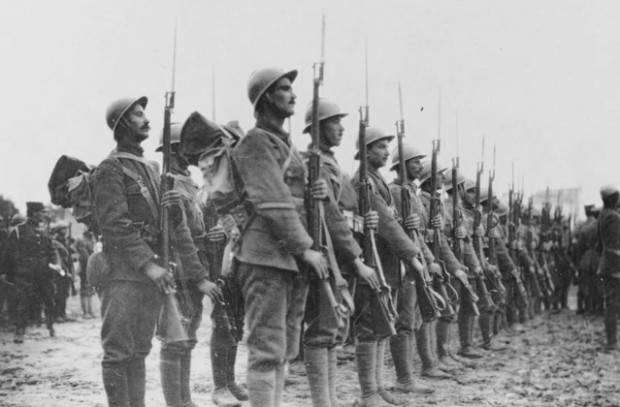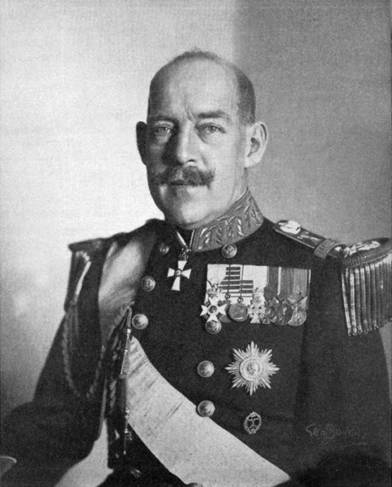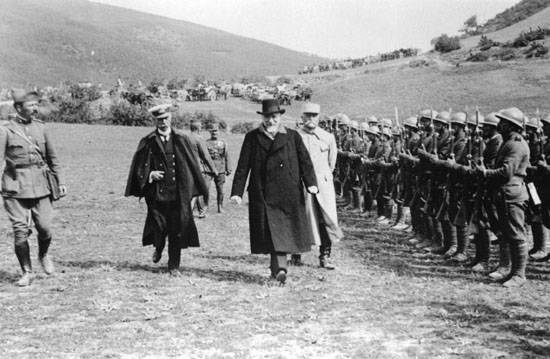As Greece at gunpoint forced to go to war

100 years ago, 2 July 1917, Greece, after long hesitations and a conflict within the country between supporters of the Entente and the Central Powers, which led to a national split, declared war on Germany, Austria-Hungary, Bulgaria and the Ottoman Empire.
Under pressure from the Entente, which threatened to open fire on Athens, King Constantine, who was against the war, 11 June 1917, abdicated from the throne, appointing his second son Alexander as his successor. After the news of the king's abdication, his supporters gathered at the palace, declaring their determination to protect the monarch. But Constantine asked everyone to calm down and disperse. The new Greek king had no real power. Thus, the power completely passed into the hands of Greek Prime Minister Eleftherios Venizelos, who created a parallel government that supported the idea of an alliance with the countries of the Entente. Significant Greece itself at this point has long been occupied by troops of the Entente countries. The new leadership of Greece headed for the final entry into the war on the side of the Entente. 29 June, the Greek government, through the mediation of Switzerland, notified the governments of Germany, Austria-Hungary, Bulgaria and Turkey about the break of diplomatic relations. 2 July, Greece entered the war. As a result, the forces of the Entente in the Balkan theater were increased.
Greece on the way to war. Milestones
On the eve of the First World War, Greece significantly strengthened its position on the Balkan Peninsula. Greece took part in the First Balkan War, wanting to get Thessaloniki. After the war, Greece received part of Macedonia and the region of Thessaloniki. When the First Balkan War ended, it turned out that the former allies could not divide the prey. Many faults were formed, which immediately caused the Second Balkan War. Particularly dissatisfied were the Bulgarians, who in the summer of 1913, attacked their recent Serb allies. 11 June 1913 was signed the Greek-Serbian alliance treaty directed against Bulgaria. Also against Bulgaria were Romania and Turkey. After the war, Thessaloniki, which Bulgaria claimed, part of Macedonia and much of the Aegean coast remained with Greece. The defeat of Bulgaria led to the fact that during the First World War, she joined the German and Austro-Hungarian sides.
In Greece, there was a split of the elite. Part of the Greek elite was focused on the Entente, the other - on Germany. Athens was hoping to get part of the "Turkish legacy" after the partition of the Ottoman Empire, in particular, the Greeks were attracted by the Straits zone and Constantinople. Germany had a serious influence on the kindred court circles. Greece was ruled by monarchs from the German house of the Glucksburg. Successes and territorial expansion during the Balkan wars strengthened the so-called Greek ruling circles. The “great idea” is actually the restoration of the Byzantine Empire and the expulsion of the Turks not only from Europe, but also from Constantinople and from a large part of Asia Minor. The idea of "Greater Greece (the revival of the Byzantine Empire led by the Greeks) was popular in Greece. And Germany promised to promote the formation of "Greater Greece" within the borders of the ancient Byzantine Empire.
The Greek king George I (1863-1913) sympathized with the Entente countries. The Greek royal family was closely related to the British and Russian dynasties: George I siblings were Alexander Queen of England, wife of Edward VII and mother of George V, as well as Russian Empress Maria Fedorovna, wife of Alexander III and mother of Nicholas II. George himself was married to Alexander Konstantinovna’s niece of Alexander II. Three of the king’s children, Alexander, Nikolai and Maria, were also married to representatives of the Romanov dynasty. Marriages strengthened relations between Greece and Russia, brought together two ruling houses, strengthened the Russophile party at the court of the king. King George I was shot dead on 18 in March 1913, at the height of military action against Turkey by an anarchist in Thessaloniki. He was succeeded by Konstantin I (1913-1917). Unlike his father, he sympathized with Germany, studied there and served in the German army. In addition, Constantine married Sophia - the sister of the German Kaiser Wilhelm II.

Greek king Constantine I
Thus, immediately before the 1914 war, the position of Greece was extremely difficult. The sympathies of the elite were divided between two hostile military-political blocs. The main supporter of the entry into the war on the side of the Entente in Greece was Prime Minister Eleftherios Venizelos, supporters of the reform of the country. The entourage of the king and much of the commanders of the army sympathized with Germany. In general, public opinion, tired of the two preceding wars, tended toward neutrality. Bulgaria was considered the direct opponent of Athens, against which the Greek-Serbian defensive alliance remained in force. However, with Serbia itself, Greece had a dispute over the area of the Monastery, and the northern Epirus, included in Albania. Turkey for the Greeks was a traditional enemy. In the spring of 1914, Greece and Turkey almost started a new war. She was prevented by the mediation of Germany disinterested in this war. It was dangerous to oppose the Entente - Greece is a peninsular and island nation, and its territory was vulnerable to attacks from the sea, dominated by the Franco-British fleet. In such conditions in Athens decided that neutrality would be the best choice. The king insisted on maintaining Greece’s neutrality, especially until the winner of the war became apparent. Belgrade was informed that the Greek-Serbian treaty meant the Balkan, and not the all-European war. This position suited Germany, it allowed to use Greece as a “window” for the delivery of valuable goods. However, the powers of the Entente were unhappy and constantly increased the pressure on Athens.
In January, 1915, in an attempt to win Athens to its side, England offered Greece post-war concessions in Asia Minor at the expense of Turkey. Venizelos, the main ideologue of the "Great Idea" of the reunification of the historically Greek lands, tried to carry out a bill on accession to the allies through the Greek Parliament. The opposition loyal to the king, the generals and their supporters forced Venizelos to resign. His resignation caused an open confrontation between supporters of King Constantine and Venizelos (the so-called National Split), which eventually led to general elections in May 1915. The Liberal Party of Venizelos won the election. Politicians again had to become the prime minister of Greece, but Constantine refused to ratify the appointment of a new government until August.
Meanwhile, Bulgaria declared war on Serbia, which created a direct threat to the new Greek province of Macedonia, including the strategically important port of Thessaloniki. Venizelos asked King Constantine to step up a mutual defense treaty with Serbia in order to protect the territory of Greece. Constantine agreed, but only on condition that Greece was attacked. Greece announced 23 on September 1915 of the mobilization of the Greek army in 180 thousand people, but refrained from any military action. After an unsuccessful attempt to persuade the king to oppose Bulgaria, Venizelos provided the British and French forces with a bridgehead in Macedonia to prepare them for an operation on Gallipoli, against Turkey. This caused confusion in the Greek government, Venizelos even declared war on Bulgaria in parliament.
In October, Anglo-French troops landed in Thessaloniki to support Serbia. The Serbs, under the pressure of the Austro-German and Bulgarian troops, will soon be defeated. The Greek government, in order to maintain its neutrality, began to concentrate in the area of Thessaloniki parts of the mobilized Greek army. On November 10, the Greek Council of Ministers, in view of the threat of hostilities within Greece, decided to disarm and intern the Serbian and Anglo-French troops, if they retreated into Greek territory. The Greeks also planned to mine the entrances to the main Greek ports. In response, Paris and London decided to strengthen the naval forces in the region of Greece. 21 November Allied squadron arrived in Milos. On November 26, the Greek government, on behalf of the Entente powers, was handed an ultimatum containing requirements as security guarantees to the Anglo-French troops in Thessaloniki: 1) remove Greek troops from Thessaloniki region; 2) to transfer to the Allies railway and other roads in the area of Thessaloniki with the aim of organizing defense in the area and in front of the Chalcedon peninsula 3) the right to inspect all ships and boats in Greek waters. Athens was forced to make concessions. The Greek government agreed not to try to disarm and intern the Allied forces. However, this seemed to Entente a little. The Allies demanded that Athens unconditionally oppose the Central Powers. France imposed a partial blockade of food supplies to Greece. In addition, the French began to provide financial support for Venizelos.
The internal crisis continued to develop. Constantine took advantage of the right of the monarch to dissolve the government unilaterally. In December 1915, Constantine forced Venizelos to resign and dissolved the parliament, which was dominated by the Liberal Party and announced new elections. Liberals boycotted this second election, which undermined the position of the new royalist government, since the government was actually appointed by the king. It split the Greek society. The landing of the Anglo-French troops in Thessaloniki in October without the permission of Athens and the formation of Thessaloniki front, turned the Greeks against the Entente, which violated the sovereignty of Greece. But later, when the Central Powers occupied Macedonia in May 1916, the public was outraged by the fact that the king was unable to defend the territory of Greece.
In 1916, the Allies forced Athens to withdraw and demobilize the army located in the rear of the Salonika army. England and France at the beginning of autumn presented new demands to Athens: 1) control over mail and telegraph (including the government radio telegraph); 2) clearing Greece of German agents on a list drawn up by Anglo-French intelligence; 3) issuing to the Allies of German and Austrian ships hiding in Greek ports. These requirements were accompanied by a demonstration of naval power and the landing of troops. The Greek government again made concessions.
On August 30, 1916, a coup against the royalist government was carried out by the Popular Defense Movement, a secret military organization founded in Thessaloniki by Venizelos supporters. As a result of the coup in Thessaloniki, the second interim government of Greece was formed. By the end of 1916, France and Great Britain, after an unsuccessful attempt to convince the royalist government to enter the war, officially recognized the government of the People's Defense Movement in Thessaloniki as the legitimate government of Greece. Thus, two governments and two armies appeared in Greece. The Royal Greek government in Athens was boycotted by the Entente and placed in conditions that did not allow it to work normally. And the Salonik government of Venizelos, also acting in the name of the King of Greece, could exist only with the power and material and monetary support of the allies. The Greek Aegean islands were subordinated to the Venizelos government with the help of fleet Entente occupying these islands. November 23, Thessaloniki interim government declared war on Germany and Bulgaria.
Meanwhile, the Entente increased military pressure on Athens. On October 10, envoys of the Entente powers handed an ultimatum to the Greek Cabinet with new requirements: 1) handing over the allies of the Greek navy to the allies; 2) disarming and partial destruction of the batteries guarding the Salamis Bay and the port of Piraeus. On November 22, the Entente demanded the surrender of the garrisons of Thessaly and Epirus and the withdrawal of Greek troops to the Morea peninsula. At the same time, the French admiral of the united squadron, Dartij de Fournet, demanded that the Athenian government surrender to him all the artillery and military equipment of the army. Athens refused to disarm. In response, the Entente was sent from Piraeus to Athens 3-thousand. English-French landing. Taking advantage of this, supporters of Venizelos 1 on December 1916 of the year rebelled in the capital. Despite the support of the rebels by the Allied forces and the navy, government forces crushed the uprising. The French and the British lost dead and wounded to 250 people.
In retaliation, the Allies captured the Greek fleet and demanded the partial disarmament of the royalist forces and their withdrawal to the Peloponnese. Also, the great powers demanded to transfer control over the main areas of the state system. As a result, the Athenian government made concessions, hoping for the lifting of the blockade. The naval blockade lasted 106 days, during which food ports did not reach the ports of mainland Greece, which were under the control of the royalist government in Athens. Thus, the Entente, having occupied the port of Piraeus and disarmed part of the Greek army and navy, actually put Greece under control.
In April, the 1917 of the Entente powers recognized for France freedom of action in Greece, up to the possibility of the overthrow of King Constantine, and the occupation of Thessaly. As a result, in June 1917, the Entente countries began to threaten to launch the bombardment of Athens if the king did not give up the throne. Constantine I was forced to yield an ultimatum, he left Greece, and his second son Alexander inherited the crown. 15 June Entente announced the lifting of the blockade and allowed ships with bread to the ports of Greece. 27 Jun Venizelos took control of the government and promised support to the Entente. 2 July, the country officially declared war on the Central Powers.
As a result, the forces of the Entente on the Thessaloniki front were increased, and the rear of the allied forces was strengthened. During the remaining months of the 18 war, the 10 divisions of the Greek army fought on the side of the allied forces against the Bulgarian and German troops in Macedonia and Bulgaria. It is worth noting that the National split was not overcome even after the end of the war. The royalists considered the liberals traitors. This led to violent political and military events in stories Greece between the two world wars.

Greek Prime Minister Eleftherios Venizelos on the front line
Information